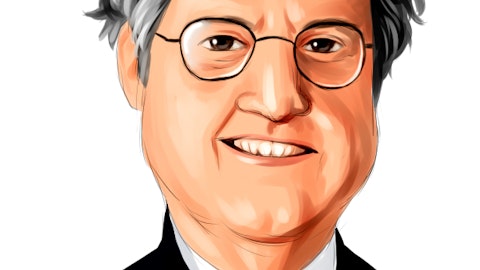Keeping track of insider transactions can be a helpful tool in gleaning the health and future prospects of stocks that are traded by insiders. Insiders, due to their management roles, are privy to more information about a company than any analyst or investor could hope to have. Because they have all available information about a company, it is wise to examine their own transactions.
In this instance, we’ll look at Smithfield Foods, Inc. (NYSE:SFD), the well-known producer and marketer of fresh meat and packaged meat products in the U.S. and internationally with a $3 Billion market capitalization. The most recent insider transactions all occurred in the previous four weeks and all were purchases.
On July 10, Executive Vice President R. Dhamu Thamodaran purchased 5,000 shares at an average price of $19.4851 per share for a total cost of $97,425.50. Currently, the stock is trading at $19.36, just below his average purchase price. Mr. Thamadaran attained his current titles in July 2011 but has been with the company longer. Prior to his appointment as Executive Vice President, he was named Sr. Vice President in June 2008 where he also became the company’s Chief Commodities Hedging Officer.
On June 28, 2012, George Richter, President and Chief Operating Officer of the Pork Group purchased a total of 1,000 shares of Smithfield Foods, Inc. at an average price of $21.1199. While the purchase was made on June 28, the transaction was reported to the SEC on July 2, 2012. While Mr. Richter did make a larger purchase in September of 2011 at higher prices, the shares acquired in this transaction are to be held in custodial trust for his grandchild. Mr. Richter has been affiliated with Smithfield or one of its divisions since he served as President of Farmland Foods pork division up until 2003.
Another recent purchase was made on June 18, 2012 by a director of the company, David Nelson. His purchase was for 5,000 shares at a weighted average price of $19.9923 per share. Mr. Nelson now holds a total of 30,000 shares after a purchase of 25,000 shares made in September of 2011 with an average price of $18.4642. Mr. Nelson was previously a portfolio manager of Altima One World Agriculture Fund and had begun that role in 2008, the same year he joined Smithfield as a director. Currently, he serves as a Global Strategist for Food & Agribusiness Research Advisory group at Rabobank International and has been there since July 2010.
Back on June 14, 2012, Smithfield announced its fiscal 2012 fourth quarter and full year results, ended April 29, 2012. For the fourth quarter, Smithfield met analysts’ expectations on sales, posting $3.2 billion. Although sales came in 3% higher from the year-ago period, net income dropped 19% to $79.5 million for $0.43 per share. That was well short of analysts expectations of $0.53 per share. Because of rising selling costs, Smithfield’s operating margins fell from 10% last year for the pork division to 1% this period. Even with the dramatic decrease, net income for the entire year was the second best in the company’s history at $361.3 million and revenues were a record $13.1 billion, up 7%.
Smithfield provided other positive news by reporting that export sales increased 35%, their interest expenses were reduced 28% (a total reduction of $70 million) and management repurchased 11.8 million shares of the company’s shares, about 7% of the total outstanding for a cost of $189 million.
Comparing Smithfield to its peer group will lend an idea of where the market values similar companies, and allows us to see where Smithfield is valued in relation to them. Cal-Maine Foods (NYSE:CALM), Hormel Foods (NYSE:HRL), Sanderson Farms (NASDAQ:SAFM) and Tyson Foods (NYSE:TSN) all have similar yields with Sanderson at the low end at 1.5%. Hormel and Cal-Main yield 2.0% and 2.1% respectively. Pilgrim’s Corp (PPC) is similar to Smithfield in that it does not pay a dividend currently. Stocks that pay a dividend will usually command a small premium over others that do not since they also provide a source of income.
Checking P/E ratios between Smithfield and its peers provides a stronger argument that the company is potentially undervalued at these levels. Except for Pilgrim’s Pride with no positive earnings and therefore no P/E ratio, all other peers in this group sport higher ratios. At the low end, Tyson’s decreasing sales growth keeps its P/E ratio at 11. Cal-Maine with moderate 5-year sales growth expectations of 13% trades at a P/E of 16. Hormel with its similar 5-year expected sales growth of 9% posts a ratio of 17. Yet Smithfield tops them all with a 5-year growth rate expected to be 11% per annum and its P/E stays in the single-digits at 9.
Smithfield did let investors and analysts down with a large drop in earnings for the quarter. However, most other fundamentals showed positive signs. With revenues for the year at an all-time record and net income second only to fiscal 2011, Smithfield might be worth considering as a value stock. At current prices ($19.36), Smithfield is trading approximately 23% below its 52-week high of $25.12. That high occurred in December of last year in the same quarter the company posted its record net income.
Several hedge fund managers also believe Smithfield is undervalued and should appreciate in price. Billionaire Paul Singer’s fund Elliot Management holds 20,000,000 shares while D.E. Shaw’s fund holds 16,500,000 shares. Millennium Management’s Israel Englander holds just 450,000 shares as of the end of March, but that is an increase of over 200% since the beginning of the year.
If Smithfield can overcome several hurdles and get back to positive net income growth, they could ease investors’ nerves about the company’s future earnings and allow them to appreciate all of the other positive marks the company achieved. If that happens, Smithfield could very well see those highs again, and this time with even better backing numbers for growth in revenues and expense reduction. Compared to its peers, Smithfield appears undervalued and may prove to be a good stock to own until the market fairly values the company again.






